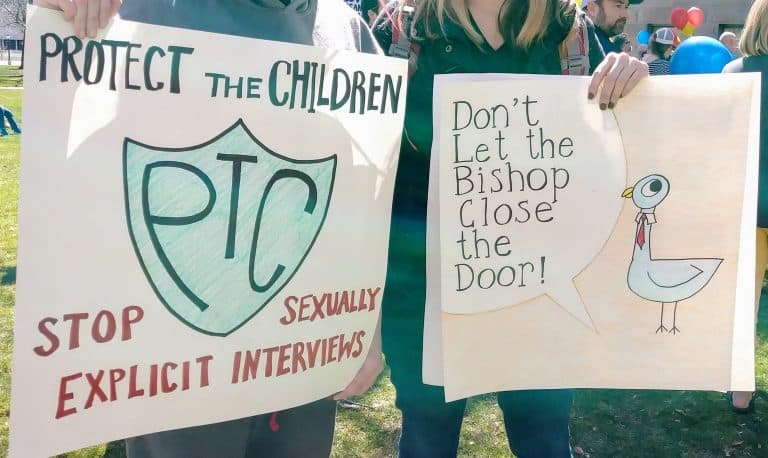
At the beginning of our two-week residency in Barcelona, my writing cohort met for cocktails in the home of Bob Antoni, a West Indian writer whose fame, if it were a cyclone, would hover over central Europe. His renovated third-floor walk-up featured hardwood floors, exposed beams, and one wall of the building’s original brick. A minimalist, Bob had accessorized the home with carefully chosen and sparse antiques. In the parlor, I became entranced by a statue—dead center between two balconies (a castle sprawled in the view beyond them). The figure, bronze, two-feet tall, and modestly robed, stood on top of an armoire. She balanced in one hand a tray of two small domes. Though they had been nipple-less, my first thought was, Boobs? They were a distinct shape, rounded, supple, even a wee gelatinous—impressive for a solid medium. The rosary draped from her robes and the fierce demureness to her expression confirmed: Catholic. As a Mormon, I didn’t know much about the religion, but it seemed to me that a Catholic statue with breasts on a platter was an oddity.
I tracked down our host and tossed a thumb at the statue. “Are those breasts on the platter?”
“Yes,” Bob said in a way that almost sounded like ‘jes’. His Caribbean accent was obscured, like molasses in a ginger cookie. “She’s St. Agatha of Sicily, patron saint of Barcelona.”
He spoke of the legends of St. Agatha. In one, she pledged her virginity to God, but when she wouldn’t give in to a Roman ruler’s sexual advances, he ordered her breasts to be detached with pinchers. In Bob’s preferred version, St. Agatha had grown tired of the constant attention from men and sliced off her own breasts. His statue depicted her offering them to God, a symbol of her unwavering devotion.
I spent a moment imagining I was St. Agatha, bent over an array of kitchen knives trying to select the instrument that would slice through my flesh. Would I select something small for its agility? At what angle would I hold the weapon? Would I start from the bottom up? Would I cut out only the rounded tissue and fold the skin back into place and stitch it closed? Less scarring that way. I didn’t once, in my abstraction, question her motives. Even in Bob’s favored tale, the “attention” St. Agatha received was almost certainly a watered-down way of saying “abuse”. To resort to self-mutilation, she likely had been sexually assaulted multiple times, perhaps violently. Maybe she tried other deterrents first, or maybe that had been her first attempt to solve the problem. Either way, I understood the conviction to remove the thing that lured lecherous men.
I hadn’t thought to cut off my own breasts in 1994 when I was twelve, living in rural Missouri, and enduring the unwanted “attention” of a man five years my elder, but then I had been as flat as a Bible cover and not entirely sure what I’d worn to tempt him.
***
A week after I had been molested, I flipped through my copy of the For the Strength of the Youth pamphlet, an addition to my religious texts when I turned twelve, and trailed my finger under the section on Dress and Appearance. “The way you dress sends messages about yourself to others and often influences the way you and others act…” I had followed the guidelines, eschewing bikinis and revealing or provocative trends, such as low-cut or off-the shoulder styles. “Immodest clothing includes short shorts, tight pants, and other revealing attire.” I slipped into my mother’s bathroom and stood in front of the full-length mirror, wondering what he had seen in me. I imagined myself in the shorts I wore that night, analyzed the level of tightness, concluding that there should be a chart to compare your pants against to see if they broadcasted wicked signals. As a robot, I mimicked my body movements during the game of Hot Lava I’d played the evening he stared at me. I paused in certain poses and imagined my mother’s past admonitions. “Hon, don’t stand like that. It’s too…” and her mouth twisted up from the lemon of the thought. Why hadn’t I cried out that night? Said, No means no, buster! I couldn’t explain my sudden paralysis, how my limbs had ossified when he’d slid close to me, his head even with my belly and breath hot on my skin. The Australia-shaped birthmark on my hip had been exposed and still I hadn’t moved.
In the weeks to follow, when I had to leave the house for school and church, I ensconced myself in jeans and flannel shirts that I stole from my brother’s closet and wore my hair slicked back in an asexual ponytail. I had acquired a couple of baby tees, the latest in 90s trends, but I hated their snugness. I much preferred to wear a genderless cocoon of oversized sweatshirts.
At some point it occurred to me that he might not have been baited by my clothes, but by my face. I had blue eyes, a nose I hadn’t grown into, and a valance of bangs. I was hardly the stuff of magazines. I’m no Topanga. And if my face had betrayed me, it wouldn’t matter what I wore.
I anesthetized with ice cream, monkey bread, and whatever sugary foods we had or that I could bake to fill the abyss in my soul. Everything had a waxy aftertaste. Abiding by the teachings of my religion, I knelt in supplication in my closet, pleading for forgiveness until my knees became bumpy from the carpet. To put it out of my mind, I filled my head with scripture verses, hymns, and articles from The New Era, a Latter-day Saint (LDS) teen magazine whose anecdotal features stressed the importance of preparing for a proselyting mission if you were a boy and temple marriage if you were a girl. I didn’t think I could do either. In church, a teacher used gum in an object lesson about our sexuality. What I learned: someone had chewed me and now no one would want me.
That summer, my ward (church community) hosted a two-day youth trip to the Dallas Temple—my first one. In several vehicles, we would caravan southwest and in the temple perform proxy baptisms for the dead. I wanted to attend, but we sinners weren’t allowed. It was a special kind of sin to enter the temple knowingly unworthy, and yet, I figured I’d apologized enough to God that surely he’d forgiven me, and maybe I’d missed the confirmation in my heart. I pretended not to be dirty as I packed for the trip. I pretended when the Young Men and Young Women (the LDS groups between the ages of twelve through eighteen) divvied into minivans. And I pretended for eight hours on the drive to Texas. My memories of that trip are murky, clouded by remorse. I can recall a distinct image from the temple: my tentative steps into the baptismal font, a trough of luminous water on the backs of twelve alabaster oxen and the sense that my sin leaked from my pores, blackening the water upon my immersion.
On the drive back, the Ashley boys “accidentally” left a pimple-faced kid, Gary, at a gas station. They drove out of sight, watching him wave, drop his bag of Swedish Fish, and step futilely toward the road. I knew that feeling. Abandoned. He could’ve use the payphone, if they’d really left him. He could’ve called his parents, and someone would’ve made the drive across two states to save him. There was someone I could call too. The repentance process had been drilled into me since I was eight and had been baptized, cleansed of wrong-doings. Not forever. Life happened. Sin happened. And in that case there was the sacrament. We sinners were to pray for forgiveness and then, each Sunday, partake of the bread and water to renew our baptismal covenants and be purified by the metaphoric body and blood of Christ. But some crimes required another rung on the repentance latter. Egregious offenses needed a third party, the ward bishop, to hear a confession. My voice would absolve me.
Upon return, I made the appointment with Bishop Ashley, a weary man with a round face and promontory baldness. He had a reputation for being spiritual and honest. I trusted him. We sat across from each other, he behind a plain desk flanked by photos of the prophet and twelve male apostles, and I on the other side of the office in a cushioned folding chair. The carpet, flecked with sepia and sage threads, curved up along the walls and rose midway up in a peculiar wainscoting, coarse enough to draw blood if you raked an elbow on it.
The platitudes were dispensed, over too quickly, and I waded in the flood of tension surrounding his question, “What can I do for you?”
My tongue dried up, words along with it, and all the moisture seemed to transfer to my tear ducts. It got so silent, not even a clock ticked. I swallowed down a nest of remorse, heaved an inhale, and wept my confession. I disclosed my wickedness, whimpered out vague details about how my molester touched me and how I just let him do it. I plucked tissue after tissue, soaked up the snot, and dropped them wadded in my lap like dead moths.
Bishop Ashley rubbed his brow. “Is this boy in the ward?”
“No. He’s not a member.”
I hoped I’d said enough to thwart questions, because I didn’t want to give up the bit of information that I found most humiliating: the fact that I let a seventeen-year-old touch me when I wasn’t even allowed to date for three more years.
The skin around his mouth drooped in a frown, like a cartoon butler or a hound dog.
“As a bishop, the Lord has blessed me with the ability to forget some of the confessions I hear. In this case, I’m going to pray that Heavenly Father helps you forget what happened too. You are clean and Heavenly Father forgives you.”
I felt as if my spirit had been blasted with a wind. Mentally, I greeted it chin-first with arms stretched in the cross. I could breathe with ease.
He and I prayed together, and I insisted he promise not to tell my parents. I didn’t want to disappoint them. I left, grateful to have peeled the Devil’s fingers from my soul.
***
In the years after I was fondled, I suffered from a sort of palliative amnesia or at the very least compartmentalized the trauma. I never forgot it, as the bishop prayed I would, but I could set the ordeal aside so that it didn’t torment me daily. The violation had slashed the nylon of my soul, and repentance patched it back together. The relief seemed immediate at the time but, looking back, my eighth grade progress report for the fall semester showed that I earned three Cs and two Ds, one in Language Arts. My grades had never dipped that low and never in English.
Part II of this essay will be posted tomorrow.
Rena is an English professor at Utah Valley University and former correspondent for The Daily Herald. She has an MFA in Creative Nonfiction, and her prose has appeared in Ruminate, Segullah, Superstition Review, Gris-Gris, Pinball, Bloody Key Society, Salt Lake Tribune, and Washington Post. She was a semi-finalist for the 2016 VanderMey Nonfiction Prize and finalist in the 2018 Writers@Work CNF Contest. She can be found at renasprose.com. This essay was originally published in Gris-Gris in Jan. 2016.







4 Responses
This is so tragic and relatable and beautifully written. Thank you.
Thanks for sharing this, Rena. It’s heartbreaking that not only were you molested, but that church teachings were so perfectly lined up to point you to blame yourself. I’m sorry that it sounds like your bishop still thought you were at least partly to blame, but I’m glad he at least didn’t make you go through some lengthy “repentance” process.
Beautifully written piece.
[…] Part I of this essay can be found here. […]